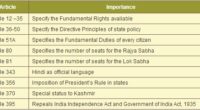Important Rules of Nouns
Some Important Rules of Nouns:
Rule 1: Some Noun exist in plural forms only. Thus ‘s’ can not be removed from such nouns to make them singular. They take plural helping verb with them.
For Example: Tongs, pincers, scissors, spectacles, goggles, gallows, fangs, alms, amends,trousers, pants, particulars, proceeds, regards, riches, savings, troops, thanks, braces, wages, belongings, etc.
Examples:
Where are my pants ?
Alms are given to beggars.
The proceeds were deposited in the bank.
Rule 2: News, politics, summons, physics, economics, mathematics, measles, athletics, linguistics, rickets, Innings are certain nouns tat are plural in form but singular in meaning. They take singular helping verb.
Examples:
No news is bad news.
Mathematics is a difficult subject.
Politics is a dirty game.
Rule 3: Cattle, infantry, poultry, peasantry, children, gentry, police and people are certain noun that are singular in form but plural in meaning. They take plural verb.
Examples:
Cattle are grazing in the field.
Police have arrested the thieves.
Rule 4: Scenery, poetry, pottery, information, business, bread, knowledge, stationery, crockery, luggage, baggage, jewellery, news, percentage, dirt, dust, traffic, music, fuel and cost are uncountable nouns and hence will take singular verb. These nouns will not take article.
Examples:
I passed the exam but the percentage of marks was not good.
Her hair is brown.
The scenery of Kashmir has enchanted us.
Rule 5: Deer, sheep, series, species, fish, crew, team, jury, aircraft are certain nouns that are used in both singular and plural verb, and if they are used in plural sense they take plural helping verb.
Examples:
A ship is grazing in the field.
Two ships are grazing in the field.
Rule 6: Hyphenated nouns does not have plural form.
Example:
He gave me five hundred – rupees notes.
Rule 7: When the definite numeral adjectives is added before the following noun, they take singular form.
For Example: Pair, Score, Gross, Dozen, Hundred, Million, Billion etc.
Examples:
I have two hundred rupees only.
He has already donated five thousand rupees
Rule 8: If a preposition comes after a noun and then the same noun is repeated, the noun should be in singular form.
Examples:
Row upon row of marble looks beautiful.
Ship after ship is arriving.
Rule 9: Nouns like teacher, student, child clerk, advocate, worker, writer, author, leader, musician etc are common gender nouns. They are used for both male and female. They are also called dual genders. Thus ‘ His / He / Him’ is used for such nouns.
Examples:
A teacher should practice what he preaches.
Every leader should perform his duty.

